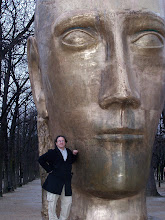I have been thinking about transgression since seeing Trey Anastasio's induction speech of Genesis into the Rock and Roll Hall of Fame last week. He gave some great examples of the wonderful transgressions that Genesis committed over the years (a hit single "Turn It On Again" written in 13/4 time for example). Berlioz was also a great transgressor. He was self taught. That must be why he really doesn't sound like anyone else except himself. He wrote strange large scale pieces that did not fit conventional categories. Even his most famous piece, the Symphonie Fantastique is not a conventional symphony with it's programatic story of unrequited love, drug overdoses and a witches' sabbath. The piece played at this concert is Harold in Italy. A typically atypical Berlioz piece. Commissioned to write a Viola Concerto by Paganini, Berlioz writes this not-a-concerto, sort-of-symphony with solo viola parts that clearly would not satisfy the notoriously show boating Paganini.
What makes this a great rather than just a good story is that after Paganini refused to play the piece because it was not virtuoso enough, he heard it performed. He then sent Berlioz 20,000 francs because he was so impressed. And now, 176 years after it was written, this strange piece is still being played in Pittsburgh, PA. Randolph Kelly, the long-time Pittsburgh Symphony principal violist, played the solo part. A solo piece that does not call for virtuosity presents it's own issues for a soloist. Kelly stayed within the piece quite well with excellent accompaniment from Yan-Pascal Tortelier and the orchestra. The delicate harp part in the first movement was quite beautiful and the big climaxes quite satisfying. The two inner movements, smaller in scale, set up the finale. I particularly enjoyed the third movement's bouncy folk tunes and great English horn part. The finale was properly dramatic (is properly really the right word there?) and a bit out of control, as Berlioz should be.
The second piece of this two piece program was Gustav Holst's The Planets. Here I have to admit that I had let myself get a skewed idea about Holst. Too many sci-fi movies and I started thinking about Holst in terms of the many film composers that stole from him, sometimes so directly that it realy is just a quote. The Planets is no longer under copyright law. I did find myself noting during the performance places where I have heard Holst ripped off. I have to credit my friend Marcus for getting me to this show, based on his unreserved love of Holst's piece.
Somehow I had gotten it in my head that Holst had written this much later than he had. This seems to fit into my denigrating of the piece. Realizing this was written from 1914-1916 puts it in a different perspective. English classical music was just emerging from obscurity with Elgar and Vaughn Williams leading the way. Those two used much more conventional and familiar forms, symphonies, concertos etc... In this way, Holst seems much like Berlioz in the choices of the forms used in his composing.
But how was the performance? Quite brilliant. Mars, the bringer of war was intense and built to an overwhelming climax. But Holst's Planets are more than just loud climaxes, as Bill Cabalero showed with his beautiful and restrained horn solos to start the Venus section. Yan-Pascal's conducting and the orchestra's playing highlighted the great variety in the seven movements (Holst left out the Earth and now that Pluto isn't a planet anymore, he's no longer behind the times). Individual members of the PSO stood out throughout the piece. Andres Cardenes was beautiful in the solo violin parts. I did find myself flashing in my brain to movie and TV (mostly sc-fi) composers that have borrowed or outright stole from Gustav.
Other highlights included the entire brass section in Jupiter, loud, clear and brilliant. The old age portrayed in Saturn was not scary but gentle and rather comforting (perhaps wishful thinking back in 1916, though perhaps the war made old age particularly alluring). The harps and wordless chorus in Neptune the mystic were ethereal and appropriately mystical.
Another great show for the PSO. Renewing my acquaintance with this piece that I had ignored for so long was quite a treat.
Subscribe to:
Post Comments (Atom)

No comments:
Post a Comment